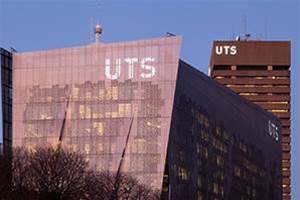The University of Technology Sydney, whose iconic brutalist tower looks over the southern end of the city’s CBD, has revealed its foray further south into the industrial heartland of Botany.

The $65 million Tech Lab will host much of the translational research and industry partnerships that apply breakthroughs in information technology to other fields of engineering and technology.
“One thing we’re very keen on with Tech Lab is to get companies in, working with us on collaborative projects that really deliver for companies as well as deliver for research the university as well,” said Tech Lab director Ray Kirby at the facility’s launch.
Officially launched on Monday, the lab has already attracted the likes of NBN Co and Sydney Water to its ranks as the custom-built facility develops and punishingly tests everything from internet of things (IoT) devices and 5G technology through to artificial intelligence and robotics.
The 9000 square metre facility houses a variety custom-built labs, including rooms that can simulate the weather from -20 degrees to 38 degrees with humidity control to test the durability of new materials and whether sensors embedded within them can survive and record accurate data.
The outcomes could also directly benefit the university's bottom line, with UTS' main Faculty of Engineering and IT (FEIT) building riddled with IoT sensors designed to help cut back on energy costs.
“We see Tech Lab as a way of joining university research with commercial problems and issues that will be really important for the future of the economy and jobs and business and growth within NSW,” associate professor Kirby said.
“What this allows us to do is to go to companies and say to them ‘where are your problems, where are your issues, what solutions do we need to work on for you?’”
Also featured are anechoic chambers that can block out either sound waves or electromagnetic waves - perfect for testing 5G and IoT devices.
“5G is a very amazing technology which we’re going to have to work on very hard in Australia because Australia has challenges for 5G which other countries don’t have,” dean of the Faculty of Engineering and IT professor Ian Burnett said.
“If we’re going to use the internet of things to enable agriculture, to enable mining and the industries that we rely on here, we’re going to have to have different solutions for communication.”
Is it still a university?
While the lab serves as a hub for industrial testing, a startup incubator, and even a small function centre available for more hands-on presentations, it will still serve over 200 students a week.
On top of introducing them to industry contacts and being a space for short courses, rather than lectures, the space is also a testbed for projects too large or heavy to fit into the university’s busy and dense high rise CBD campus.
For the academics, Botany provides a hub for combining different areas of research that are normally siloed away in different buildings or faculties - the Tech Lab’s particular focus will be on combining IT research with heavier engineering disciplines.
Projects and partnerships at the Tech Lab could also contribute to UTS’ goals of having all of its students complete industry-relevant internships and producing workforce-ready graduates.
Areas of study that are more focused on pure IT, such as data analytics' impact on superannuation or research into cybersecurity for the education and telecommunication sectors, will remain at the CBD campus.


_(23).jpg&h=140&w=231&c=1&s=0)

.png&h=140&w=231&c=1&s=0)
_(28).jpg&h=140&w=231&c=1&s=0)





 iTnews Benchmark Awards 2026
iTnews Benchmark Awards 2026
 iTnews Executive Retreat - Security Leaders Edition
iTnews Executive Retreat - Security Leaders Edition
 iTnews Cloud Covered Breakfast Summit
iTnews Cloud Covered Breakfast Summit
 The 2026 iAwards
The 2026 iAwards












_(1).jpg&h=140&w=231&c=1&s=0)



